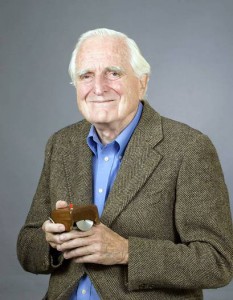
Douglas Engelbart dies at age 88; computer visionary
Doug Engelbart: A computing giant passes away
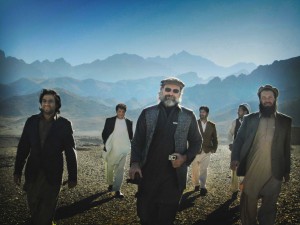
The Merry Pranksters Who Hacked the Afghan War
It was a dark time in a long, drawn-out war. Afghanistan was festering with resentment. The Pentagon brass were desperate. It was the kind of last-ditch moment when authorities start throwing an era’s weirdest ideas at its most hopeless bureaucratic mistakes.
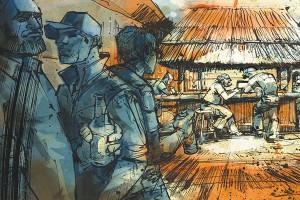
(ILLUSTRATIONS: GRAHAM SMITH)
By
Pacific Magazine, July 1, 2013
For a long time, the Taj Guest House was about the only place you could get a beer in Jalalabad. The provincial capital, about 30 miles from the infamous mountains of Tora Bora, has been the main staging ground for U.S.-led forces in the eastern part of Afghanistan since the early days of the war. When I showed up in the city in November 2011 to report on the propaganda efforts of a franchising Taliban, I found myself at the Taj. There wasn’t much to the pub—just a bamboo-covered bar, a fireplace, a glass-fronted cooler with some Heineken stacked inside, and a few bottles of vodka and other spirits lined up under the red glow of a lamp.
Plus there was an odd little sign: “We share information, communication, (and beer).”
Continue reading “REVEALED: The True Story of Dr. Dr. Dave Warner and the Synergy Strike Force”
Phi Beta Iota: Well worth careful examination. A useful categorization of many services, all of which have something to do with sharing, and none of which actually contribute to sense-making, decision-support, or true cost accountability. Now imagine this same map, but this time every single element is part of a world brain and global game in which all data is inter-operable and geospatially as well as time tagged, and every datum is weighted and also linked to all true cost information, all in a whole systems context. Cost and corruption anomalies will “light up” — achievable savings and individual needs that — if met — will generate surplus wealth for the community. Yahoo overpaid for tumbl — and will probably overpay for a few other things — instead of actually thinking through how to entice best in class, one from each, while building the other half — the sense-making in context half — that does not exist.
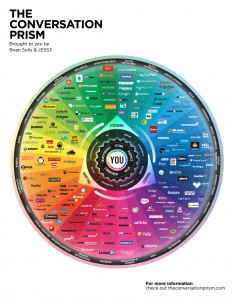

Posted: 27 Jun 2013 08:46 PM PDT
Free information will be our doom, Quartz‘s Jaron Lanier asserts in, “Free Information, as Great as it Sounds, Will Enslave Us All.” From high-frequency trading to online marketing, insists Lanier, big data is being used by those with the resources to collect and manipulate it to enrich themselves. Meanwhile, those of us with just paltry, personal devices are the ones creating the information, creating the value that fuels such systems. It is an argument that has been advanced before, and Lanier pursues the thread:
“Something seems terribly askew about how technology is benefiting the world lately. How could it be that so far the network age seems to be a time of endless austerity, jobless recoveries, loss of social mobility, and intense wealth concentration in markets that are anemic overall? How could it be that ever since the incredible efficiencies of digital networking have finally reached vast numbers of people that we aren’t seeing a broad benefit? . . .
“While people are created equal, computers are not. When people share information freely, those who own the best computers benefit in extreme ways that are denied to everyone else. Those with the best computers can simply calculate wealth and power away from ordinary people.”
See the article for its supporting arguments. Lanier does not leave us hanging for a potential solution. He recalls a suggestion he credits to Ted Nelson, which the IT pioneer made back in 1960: embed a “universal micropayment system” into any digital communication network, so that each individual who contributes any bit of data would get a bit of compensation in return. In that reality, for any tweet each of us sent, search query we made, or even security-camera image of us that was later used by any organization (for whatever purpose), we might become a few cents richer.
Interesting idea; can it gain any traction before the current system is set in stone?
Cynthia Murrell, July 01, 2013
Sponsored by ArnoldIT.com, developer of Augmentext
See Also:
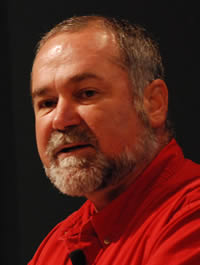
I know of three ways to get from today to a prosperous world at peace, a world that works for all — all three merit consideration as a whole.
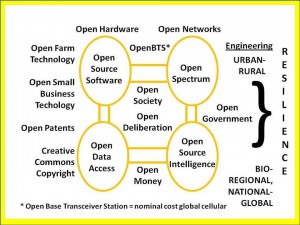
01. Open Source Everything (OSE). This is the technical solution. The US Government is ignorant and arrogant in part because the cult of secrecy and the ineptitude of chief technical officers, combined with the corruption of political figures that have no interest in knowing anything useful (they attend to those that pay to be heard), have resulted in Washington operating on less than 2% of the relevant information [a typical Country Team collects 20% at most and spills 80% of that in how it handles it] and in the case of the secret world, producing “at best” 4% of what the President or a major commander needs. The future of governance is to be found in bottom-up information sharing and sense-making across all boundaries. Only OSE is affordable, inter-operable, and scalable. This is where the BRICS, the EU, and NATO should be focusing as they create 21st Century Alternative C2 (collaboration and consensus have replaced command and control) — one must give up unilateral command and control in order to gain multilateral command and control.
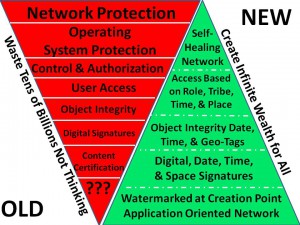
Robert Garigue (RIP) understood what none of the US cyber-chiefs understand: in a decentralized technical environment, human trust is the measure of merit, and security must be embedded such that it is NOT reliant on centralized points that are often asleep, ignorant, arrogant, under-funded, and generally useless. As Col Dr. Max Manwaring and his various contributing authors point out in The Search for Security: A U.S. Grand Strategy for the Twenty-First Century (Praeger, 2003), the primary foundation for both prosperity and peace is LEGITIMACY. A Nobel prize was awarded to the economist that demonstrated that trust lowers the cost of doing business. In brief, proprietary and predatory forms of capitalism have become one. The time has come to create Open Source Ecologies (a fine model is provided by Open Source Ecology, creating a toolkit for civilization), starting with an Autonomous Internet and Liberation Technologies that enable the five billion poor to create infinite wealth. If freedom is our objective, rather than fraud, it demands open source everything. My long-standing vision for an Open Source Agency (OSA) has morphed toward the nurturing of all of the opens as I have discovered that no one open alone will do — they form an unbeatable force for good when combined.
Continue reading “2013 Robert Steele: Concise Summary of Three Paths to a Prosperous World at Peace”

Rachel Naomi Remen offers a story about how wholeness became embedded in the world, waiting for us to call it forth. I explore different dynamics of wholeness and how it relates to being agents of healing and transformation – including the power of disturbance to evoke grace.
Wholeness moving in us and the world
Rachel Naomi Remen offers a story about how wholeness became embedded in the world, waiting for us to call it forth. I explore different dynamics of wholeness and how it relates to being agents of healing and transformation – including the power of disturbance to evoke grace.
Healing is about restoring former wholeness. Health is about maintaining existing wholeness. Transformation and evolution are about generating or evoking new forms of wholeness from – as Rachel Naomi Remen puts it in the piece below – “the seed of a greater wholeness, a dream of possibility”.
To a certain extent new forms of wholeness can be created, as in art, innovative technologies, or the unique synergies and dynamic tensions of a groundbreaking work of architecture or engineering. Yet some of the most remarkable forms of wholeness are organic and self-organized, from new ecosystems and babies’ personalities to spontaneous realizations and cultural shifts. Although this kind of wholeness can’t be created in a linear sense and normally simply happens by itself, it can also be catalyzed, evoked, or nurtured by invitation, inspiration, opportunity, and – as Rachel Naomi Remen puts it – by “our listening, our belief, our encouragement and our love.”
“Emergent processes” like Open Space and World Cafe are, in essence, ways to enhance a group’s capacity for generating novel but self-organized wholeness from among its members. I like to think of these processes as thoughtfully designed channels for the Tao, the Way of Nature, whose power is not in what it does but in what it allows, evokes, and facilitates.
Continue reading “Tom Atlee: Rachel Naomi Remen on Wholeness Among Us and With World”

Elizabeth Weaver Engel and Jeff De Cagna are the authors of a small but very useful guide to Content Curation originally written for membership groups, and first published in November 2012. The guide offers a good introduction to why content curation is so important, how it can help any organization and what are the key things to know about it for anyone who knows little or nothing about it. From the original PDF guide, entitled “Attention Doesn't Scale: The Role of Content Curation in Membership Associations“:
“Content curation provides a potential path to a new type of thought leadership, one that is more suited to a world where information is no longer the scarce resource. Focus is. Meaning is. Wisdom is.
But that type of support will require a signicant shift in our business models.
For decades, associations have been in the business of generating information.
Our challenge now is to transform ourselves into being in the business of sense-making, helping members distinguish what new information is most relevant and integrate that information into their mental categories, and meaning-making, helping them understand the implications of that new information for their worldviews.”
Lots of good tips, references and relevant resources listed. Provides good foundational reference for any serious business reader. Good intro to content curation. Resourceful. Informative. 8/10. Pass it on.
YouTube Z(23:41) video: The Role of Content Curation in Associations: Interview With Elizabeth Engel) by Brian Kelly of AssociationMaves.com